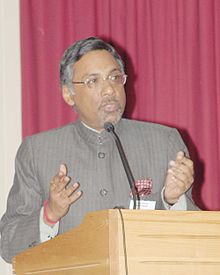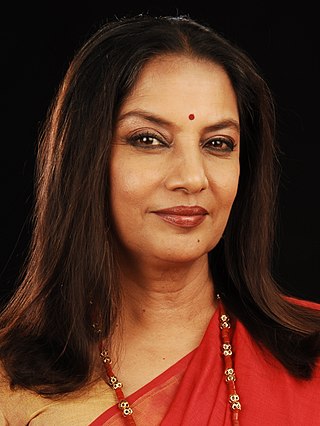
Shabana Azmi is an Indian actress of film, television and theatre. Her career in the Hindi film industry has spanned over 160 films, mostly within independent and neorealist parallel cinema, though her work extended to mainstream films as well as a number of international projects. One of India's most acclaimed actresses, Azmi is known for her portrayals of distinctive, often unconventional female characters across several genres. She has won a record of five National Film Awards for Best Actress, in addition to six Filmfare Awards and several international accolades. The Government of India honoured her with the Padma Shri in 1998 and the Padma Bhushan in 2012.
Indian poetry and Indian literature in general, has a long history dating back to Vedic times. They were written in various Indian languages such as Vedic Sanskrit, Classical Sanskrit, Ancient Meitei, Modern Meitei, Telugu, Tamil, Odia, Maithili, Kannada, Bengali, Assamese, Hindi, Marathi and Urdu among other prominent languages. Poetry in foreign languages such as English also has a strong influence on Indian poetry. The poetry reflects diverse spiritual traditions within India. In particular, many Indian poets have been inspired by mystical experiences. Poetry is the oldest form of literature and has a rich written and oral tradition.

Sant Tukaram Maharaj, also known as Tuka, Tukobaraya, Tukoba, was a Hindu, Marathi Saint of Varkari sampradaya" in Dehu village, Maharashtra in the 17th century. He was a bhakt of the god Vithoba of Pandharpur. He is best known for his devotional poetry called Abhanga, which are popular in Maharashtra, many of his poems deals with social reform.
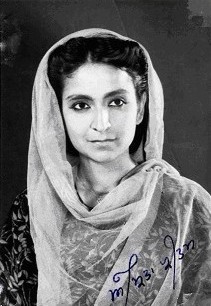
Amrita Pritam was an Indian novelist, essayist and poet, who wrote in Punjabi and Hindi. A prominent figure in Punjabi literature, she is the recipient of the 1956 Sahitya Akademi Award. Her body of work comprised over 100 books of poetry, fiction, biographies, essays, a collection of Punjabi folk songs and an autobiography that were all translated into several Indian and foreign languages.

Ahmed Ali was a Pakistani novelist, poet, critic, translator, diplomat and scholar. A pioneer of the modern Urdu short story, his works include the short story collections: Angarey (Embers), 1932; Hamari Gali, 1940; Qaid Khana, 1942; and Maut Se Pehle, 1945. His other writings include Twilight in Delhi (1940), his first novel in the English language.

Kaifi Azmi was an Indian Urdu poet. He is remembered as the one who brought Urdu literature to Indian motion pictures. Together with Pirzada Qasim, Jaun Elia and others he participated in many memorable Mushaira gatherings of the twentieth century. He was also a communist who wanted to see India one day become a socialist state. His wife was theatre and film actress Shaukat Kaifi.
A shayar is a poet who composes sher or couplet in Urdu poetry. A shayar is someone who writes ghazals, nazms using the Urdu, Hindi & Bangla language.
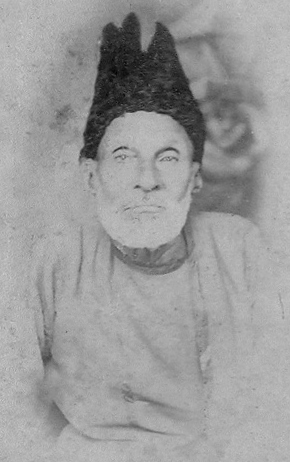
Mirza Beg Asadullah Khan (1797–1869), also known as Mirza Ghalib, was an Indian poet. He was popularly known by the pen names Ghalib and Asad. His honorific was Dabir-ul-Mulk, Najm-ud-Daula. During his lifetime, the already declining Mughal Empire was eclipsed and displaced by the British East India Company rule and finally deposed following the defeat of the Indian Rebellion of 1857; these are described through his work.
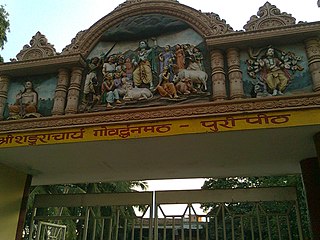
Purvamnaya Sri Govardhana Pitham or Govardhan Math is one amongst the four cardinal pithams established by the philosopher-saint Adi Shankara to preserve and propagate Hinduism and Advaita Vedanta, the doctrine of non-dualism. Located in Puri in Odisha, India, it is the Eastern Āmnāya Pītham amongst the four pithams, with the others being the Sringeri Śārada Pīṭhaṃ (Karnataka) in the South, Dvārakā Śāradā Pītham (Gujarat) in the West, Badari Jyotirmaṭha Pīṭhaṃ (Uttarakhand) in the North .It is associated with the Jagannath temple. Their Vedantic mantra or Mahavakya is Prajñānam brahma and as per the tradition initiated by Adi Shankara it holds authority over the Rigveda. The head of the matha is called Shankarayacharya, the title derives from Adi Shankara.
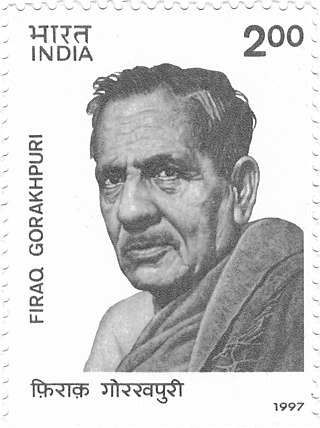
Raghupati Sahay, also known by his pen name Firaq Gorakhpuri, was an Indian writer, critic, and, according to one commentator, one of the most noted contemporary Urdu poets from India. He established himself among peers including Muhammad Iqbal, Yagana Changezi, Jigar Moradabadi and Josh Malihabadi.

Bannanje Govindacharya was an Indian philosopher and Sanskrit scholar versed in Veda Bhashya, Upanishad Bhashya, Mahabharata, Puranas and Ramayana. He wrote Bhashyas (commentaries) on Veda Suktas, Upanishads, Shata Rudriya, Brahma Sutra Bhashya, Gita Bhashya and was an orator. He was awarded the Padma Shri by the Government of India in 2009.

Rajinder Singh Bedi was an Indian Urdu writer of the progressive writers' movement and a playwright, who later worked in Hindi cinema as a film director, screenwriter and dialogue writer and he is grandfather to Rajat Bedi and Manek Bedi.
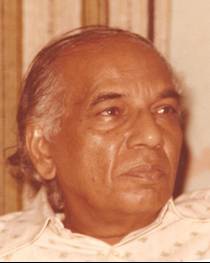
Syed Ali Jawad Zaidi was an Indian Urdu poet, scholar, and author of over 80 books in several languages. He was also an Indian independence activist, lawyer and later, a civil servant, but is best known for his work in Urdu literature.

Gulzar is an Indian Urdu poet, lyricist, author, screenwriter, and film director known for his works in Hindi cinema. He is regarded as one of greatest Urdu poets of this era. He started his career with music director S.D. Burman as a lyricist in the 1963 film Bandini and worked with many music directors including R. D. Burman, Salil Chowdhury, Vishal Bhardwaj and A. R. Rahman. Gulzar also writes poetry, dialogues and scripts. He directed films such as Aandhi and Mausam during the 1970s and the TV series Mirza Ghalib in the 1980s. He also directed Kirdaar in 1993.
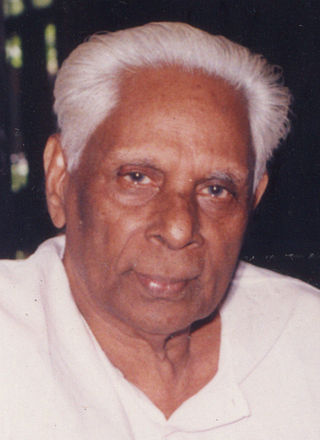
Thirunalloor Karunakaran was a poet, scholar, teacher and leftist intellectual of Kerala, India.

Abhay Kumar [Pen Name Abhay K.] is an Indian poet-diplomat, editor, translator and anthologist. and currently serves as the deputy director general of Indian Council for Cultural Relations (ICCR), New Delhi. He joined the Indian Foreign Service in 2003 after doing master's in geography at Jawaharlal Nehru University and Kirorimal College, Delhi University. He served as India's 21st ambassador to Madagascar and Comoros from 2019-2022 and as India's Deputy Ambassador to Brazil from 2016-2019. He earlier served as Spokesperson and First Secretary at the Indian Embassy in Kathmandu, Nepal from 2012-2016 and as Acting Consul General of India in St. Petersburg, and Third/Second Secretary at Indian Embassy, Moscow, Russia from 2005 to 2010. He served as Under Secretary for Public Diplomacy at the Ministry of External Affairs from 2010-2012 and sent out the first tweet on its behalf in 2010 starting a new era of India's Digital Diplomacy.

K. Srilata is an Indian poet, fiction writer, translator and academic based in Chennai. Her poem, In Santa Cruz, Diagnosed Home Sick won the First Prize in the All India Poetry Competition in 1998. She has also been awarded the Unisun British Council Poetry Award (2007) and the Charles Wallace writing residency at the University of Sterling (2010). Her debut novel Table for Four was long-listed in 2009 for the Man Asian Literary Prize and released in 2011.

Jagannath Prasad Das is an Indian writer, poet,painter, playwright and novelist who writes in Odia.
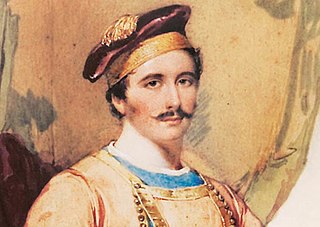
William Fraser was a British India civil servant who was an Agent to the Governor General of India and Commissioner of the Delhi Territory during the reign of the last Mughal Emperor, Bahadur Shah Zafar. He was a brother of James Baillie Fraser.
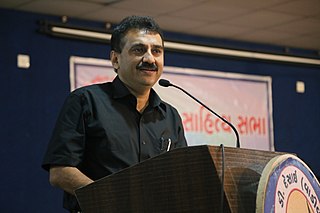
Raeesh Maniar is a Gujarati language poet, translator, playwright, columnist, compere, lyricist and script writer from Gujarat, India. His significant works include Kafiyanagar (1989), Shabda Mara Swabhavma J Nathi (1998) and Aam Lakhvu Karave Alakh Ni Safar (2011). He has written two reference books for students of ghazals, Ghazal: Roop ane Rang (2006) and Ghazal Nu Chhandovidhan (2008). The later work contains original research that may be applicable to prosody of all north Indian languages. He has written lyrics for several Gujarati and Hindi language movies. The Indian National Theater of Mumbai awarded him the Shayda Award for 2001 and the Kalapi Award for 2016 for his contributions to Gujarati ghazal poetry.
